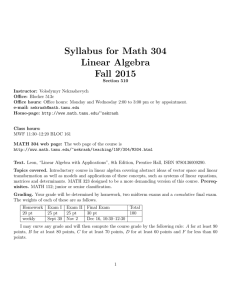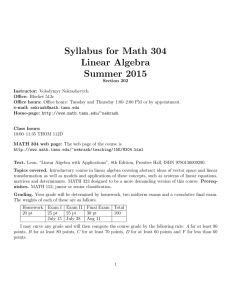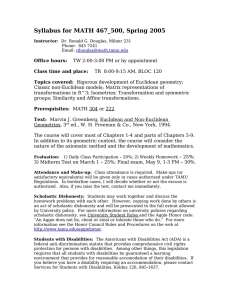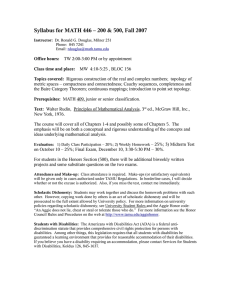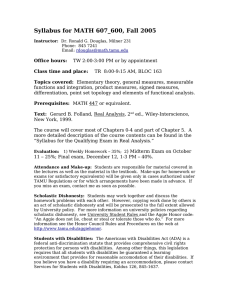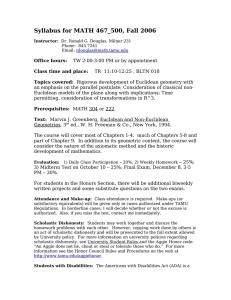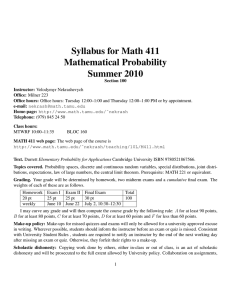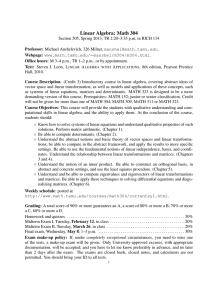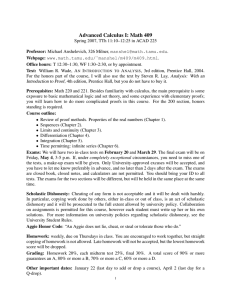Syllabus for Math 304 Linear Algebra Fall 2013
advertisement
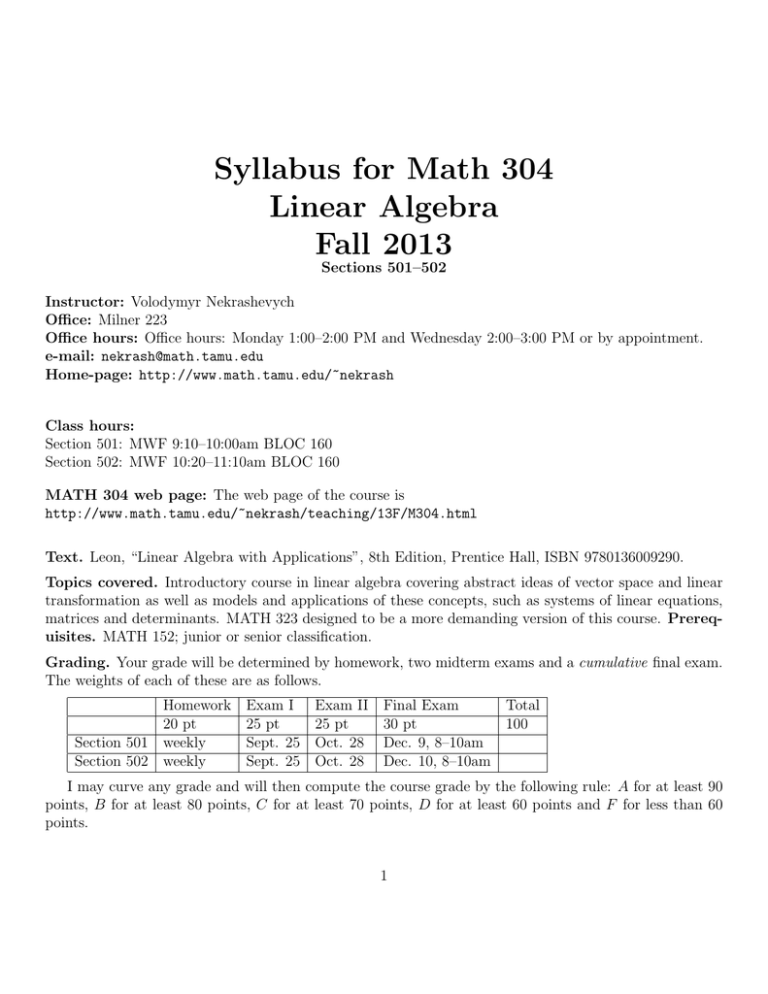
Syllabus for Math 304 Linear Algebra Fall 2013 Sections 501–502 Instructor: Volodymyr Nekrashevych Office: Milner 223 Office hours: Office hours: Monday 1:00–2:00 PM and Wednesday 2:00–3:00 PM or by appointment. e-mail: nekrash@math.tamu.edu Home-page: http://www.math.tamu.edu/~nekrash Class hours: Section 501: MWF 9:10–10:00am BLOC 160 Section 502: MWF 10:20–11:10am BLOC 160 MATH 304 web page: The web page of the course is http://www.math.tamu.edu/~nekrash/teaching/13F/M304.html Text. Leon, “Linear Algebra with Applications”, 8th Edition, Prentice Hall, ISBN 9780136009290. Topics covered. Introductory course in linear algebra covering abstract ideas of vector space and linear transformation as well as models and applications of these concepts, such as systems of linear equations, matrices and determinants. MATH 323 designed to be a more demanding version of this course. Prerequisites. MATH 152; junior or senior classification. Grading. Your grade will be determined by homework, two midterm exams and a cumulative final exam. The weights of each of these are as follows. Section 501 Section 502 Homework 20 pt weekly weekly Exam I 25 pt Sept. 25 Sept. 25 Exam II 25 pt Oct. 28 Oct. 28 Final Exam 30 pt Dec. 9, 8–10am Dec. 10, 8–10am Total 100 I may curve any grade and will then compute the course grade by the following rule: A for at least 90 points, B for at least 80 points, C for at least 70 points, D for at least 60 points and F for less than 60 points. 1 Plan of lectures. 8/26 1.1. Systems of linear equations. 8/28 1.1. Matrix of a system. Elementary row operations. 8/30 1.2. Row echelon form. Gaussian elimination. 9/2 1.2. Row echelon form. 9/4 1.3. Matrix algebra 9/6 1.3. Matrix multiplication, its properties. 9/9 1.4. Elementary matrices. 9/11 2.1. Determinant of a matrix. 9/13 2.1. Determinant of a matrix. 2.2. Properties of determinants. 9/16 2.2. Properties of determinants. Computing determinants using Gaussian elimination. 9/18 3.1. Vector spaces. Definitions and examples. 9/20 3.1. Vector spaces. Definitions and examples. 9/23 Overview. 9/25 First midterm exam. 9/27 3.2. Subspaces. 9/30 3.3. Linear independence. 10/2 3.3. Linear independence. Spaces of functions. 10/4 3.4. Basis and dimension. 10/7 3.4. Change of basis. 10/9 3.4. Change of basis. Transition matrix. 10/11 3.5. Row space and column space. Applications to systems of linear equations. 10/14 3.5. Row space and column space. Applications to systems of linear equations. 2 10/16 4.1. Linear transformations. Definitions and examples. 10/18 4.1. Linear transformations. Definitions and examples. 10/21 4.2. Matrix representations of linear transformations. 10/23 4.2. Matrix representations of linear transformations. 10/25 Overview. 10/28 Second midterm exam. 10/30 4.3. Similarity, changes of basis for a linear transformation. 11/1 5.1. Orthogonality. The scalar product in Rn . 11/4 5.4. Inner product spaces. 11/6 5.5. Orthonormal sets 11/8 5.6. The Gram-Schmidt orthogonalization process. 11/11 6.1. Eigenvalues and eigenvectors. 11/13 6.1. Eigenvalues and eigenvectors. 11/15 6.3. Diagonalization. 11/18 6.3. Diagonalization. 11/20 6.3. Exponent of a matrix. 11/22 5.7. Orthogonal polynomials. 11/25 5.5. Trigonometric polynomials. Fourier transform. 11/27 Overview. 12/2 Overview. 3 Make-up policy: Make-ups for missed quizzes and exams will only be allowed for a university approved excuse in writing. Wherever possible, students should inform the instructor before an exam or quiz is missed. Consistent with University Student Rules , students are required to notify an instructor by the end of the next working day after missing an exam or quiz. Otherwise, they forfeit their rights to a make-up. Scholastic dishonesty: Copying work done by others, either in-class or out of class, is an act of scholastic dishonesty and will be prosecuted to the full extent allowed by University policy. Collaboration on assignments, either in-class or out-of-class, is forbidden unless permission to do so is granted by your instructor. For more information on university policies regarding scholastic dishonesty, see University Student Rules. Remember the Aggie Code of Honor: “An Aggie does not lie, cheat, or steal or tolerate those who do.” Copyright policy: All printed materials disseminated in class or on the web are protected by Copyright laws. One xerox copy (or download from the web) is allowed for personal use. Multiple copies or sale of any of these materials is strictly prohibited. Americans with Disabilities Act (ADA) Policy Statement: The Americans with Disabilities Act (ADA) is a federal anti-discrimination statute that provides comprehensive civil rights protection for persons with disabilities. Among other things, this legislation requires that all students with disabilities be guaranteed a learning environment that provides for reasonable accommodation of their disabilities. If you believe you have a disability requiring an accommodation, please contact Disability Services, in Cain Hall, Room B118, or call 845-1637. For additional information visit http://disability.tamu.edu. 4
